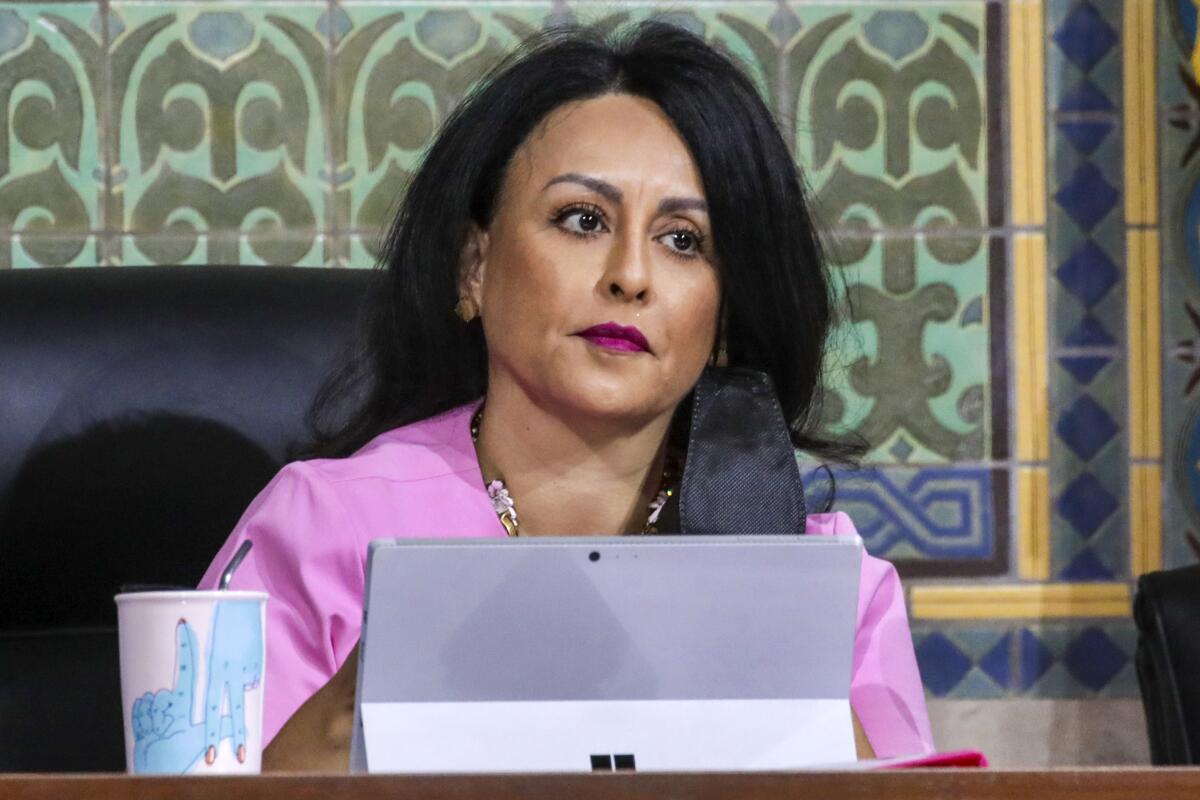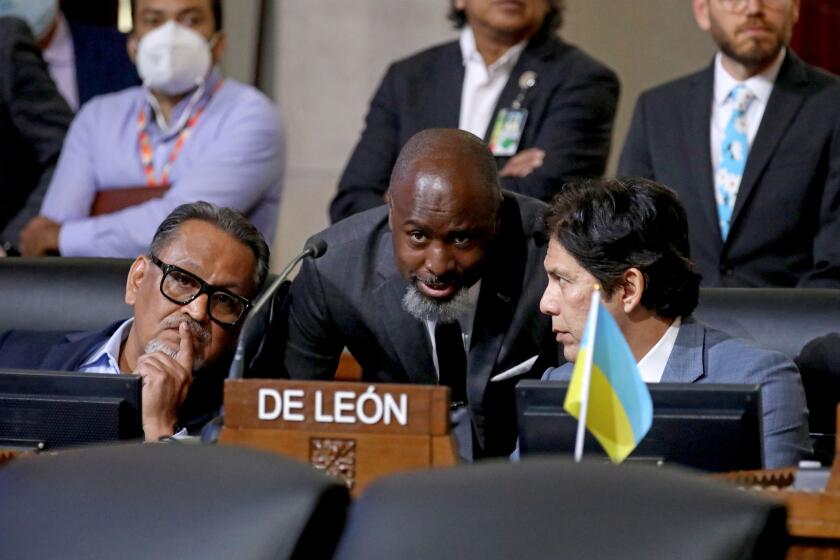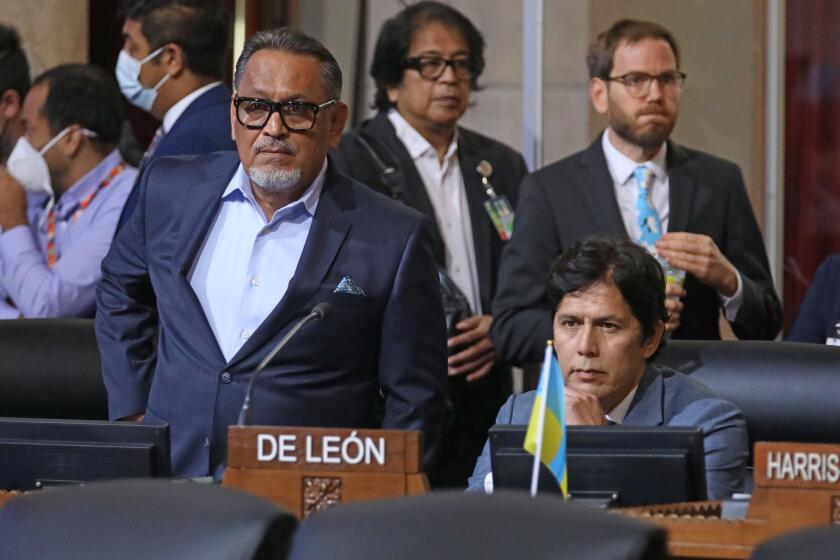Column: In the hands of politicians, redistricting can be poisonous. The cure is an independent commission

- Share via
SACRAMENTO — The hateful, racist conversation secretly recorded among Los Angeles City Council members illustrates a reality: Self-interest redistricting brings out the worst in politicians.
The infamous discussion between three council members and a labor leader focused, after all, on how best to gerrymander the politicians’ districts to benefit them and their Latino allies and hurt their rival colleagues.
The city of L.A., including its politicians, would be much better off if it dumped the corrupt system of drawing lines for council districts. It should adopt a clean method similar to what the county already has created and California voters forced on the state more than a decade ago.
County supervisorial, state legislative and U.S. House districts are drawn by independent commissions that cannot be influenced by the affected politicians. Elected officials are forbidden from taking a role in selecting the commissioners and can’t mess with their line drawings.
There’s a move toward that in L.A., triggered by the ugly recorded dialogue. Hopefully, the move won’t sputter and die when the public outrage calms.
Actually, the tainted, newly adopted council lines should be erased and fresh ones drawn for the 2024 elections.
In the city’s system, the redistricting commission is appointed by the council and other elected officials. And the council approves the commission’s final maps. So, they get altered to suit the political needs of council members.
“I don’t think, in the wake of the tape, that the lines have the legitimacy they need,” City Atty. Mike Feuer told Politico.
Fred Ali, chairman of the city redistricting commission, told The Times: “This should be a reminder that elected officials should not have any involvement in a redistricting process. It should be an independent process. When it’s not, you get the kind of manipulation you see reflected in these audiotapes.”
In the furor over the racist leaked audio, calls are growing for the city to throw out the boundary lines drawn last year for the council’s 15 districts.
Ali was appointed to the commission by then-council President Nury Martinez, who spewed most of the racism and hate in the taped conversation and resigned under pressure last week.
“Theoretically, when drawing district lines, the interests of the governed should come first rather than the interests of those who govern,” says longtime L.A.-based Democratic strategist Darry Sragow, who teaches election law at USC.
But that, of course, is a utopian view. It cannot become a reality when politicians are allowed to choose their own voters. The public’s interest doesn’t make the priority list.
“Redistricting is the ultimate fight for power,” Sragow continues. “In this case, it determines who gets to run the city of L.A.”
In his USC lectures, Sragow likes to quote Chinese communist revolutionary Mao Zedong, who said: “Politics is war without bloodshed.”
“People don’t play nice because it’s about power,” Sragow says. “It’s just mean.”
But that doesn’t excuse mean-spirited talk of the ilk the councilmembers disgorged or tolerated — sometimes chortling.
“It was disgusting,” Sragow says.
Their private plotting a year ago over divvying up council districts to their advantage brought out the worst in the meeting participants: Martinez, Councilmembers Kevin de León and Gil Cedillo, and then-President Ron Herrera of the L.A. County Federation of Labor.
Herrera quickly resigned after the audio was revealed by The Times on Oct. 9. Martinez followed later. De León and Cedillo were hanging on at this writing despite public and political pressure to get lost.
The councilmembers allowed then-City Council President Nury Martinez to rattle on with her racist diatribe without telling her it was unacceptable, securing their political fall, columnist George Skelton writes.
Though Martinez’s nasty rhetoric dominated, the others tolerated it and even chimed in with their own verbal venom.
Martinez called white Councilmember Mike Bonin, who is gay, a “little bitch.” His Black toddler son was referred to, in Spanish, as a “little monkey.” L.A. County Dist. Atty. George Gascón? “F— that guy. He’s with the Blacks.”
Martinez mocked Indigenous Oaxacans as “little, short dark people” and called them “ugly.” That came as they talked about how to divide up Koreatown, a largely Latino neighborhood. Martinez said placing the entire area in Councilmember Nithya Raman’s district — she wanted it — would “not [be] a good thing for any of us” because it would strengthen her politically.
“I get what we have to do, right? Just massage to create districts that benefit you all,” Herrera said.
There was much discussion about preserving or acquiring significant economic assets in predominantly Latino districts, such as USC, Los Angeles International Airport, the Van Nuys Airport and the Anheuser-Busch brewery — any established, major business or public facility.
Such talk is common during a decennial redistricting. But the politicians aren’t concerned about assets benefiting the community. The facilities are already there boosting the local economy, regardless of whose council district they’re in.
What the politicians are concerned about are assets that can benefit them in schmoozing and fundraising — maybe some freebie concert tickets or, most important, hefty campaign contributions.
“Republicans wanted country clubs in their districts as a fundraising base,” recalls Tony Quinn, a GOP redistricting consultant when the Legislature drew its own lines. “Democrats wanted any nearby movie studio so they could hit up the stars for campaign contributions.”
Paul Mitchell, who owns Redistricting Partners, a consulting firm that provided demographic data for the commission redrawing L.A. City Council lines, says: “If you get a developer building in your district, you’re going to get [campaign] checks from that developer. If he’s building in the next district, he’s going to ignore you.”
Redistricting, Mitchell adds, “has this combination of raw political power and obscurity. Few people can understand it. That’s why it becomes so corruptive.”
In the hands of politicians, redistricting can be poisonous. The cure is an independent commission.
More to Read
Sign up for Essential California
The most important California stories and recommendations in your inbox every morning.
You may occasionally receive promotional content from the Los Angeles Times.













